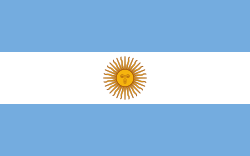| Argentina at the 2015 Summer Universiade | |
|---|---|
 | |
| IOC code | ARG |
| NOC | Comité Olímpico Argentino |
| Website | http://www.coarg.org.ar/ |
| in Gwangju, South Korea 3 – 14 July 2015 | |
| Competitors | 82 in 15 sports |
| Medals Ranked 62nd |
|
| Summer Universiade appearances (overview) | |
Argentina participated at the 2015 Summer Universiade in Gwangju, South Korea.